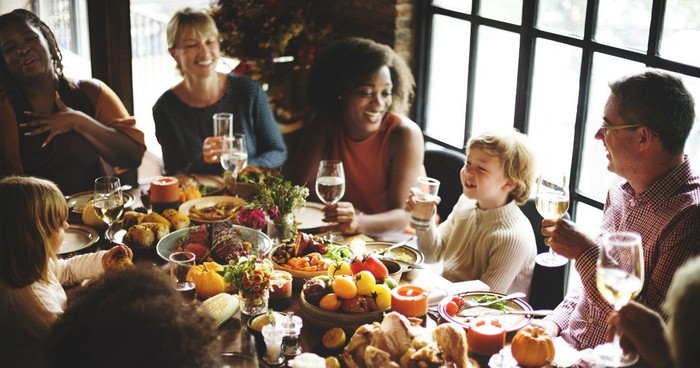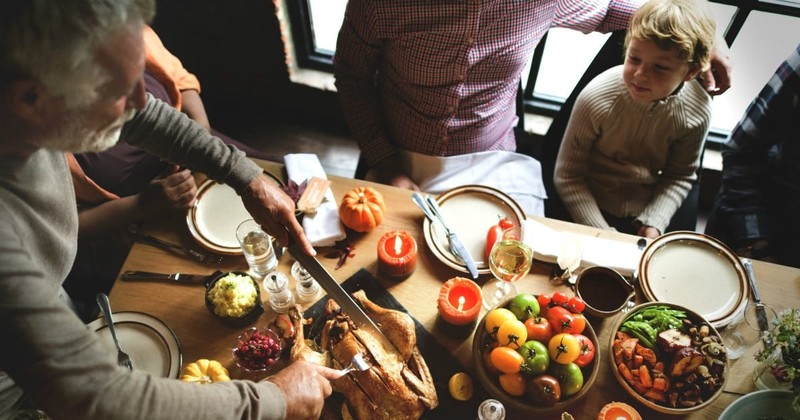
The trees are losing their leaves of fire, and Target is fa-la-la-ing its way to Christmas already. The holidays are around the corner, and feelings of warmth and love fill my heart. I can picture families in their homes, gathered around the table to celebrate, eat, and enjoy one another’s presence (and presents). It’s the most wonderful time of the year for many.
When I was younger, I wasn’t able to imagine anything outside of that picture, but as I’ve witnessed and experienced the resounding ache the holidays can bring, I’ve learned to look for those who need a home to rest in, a family to belong to, a table to celebrate at. I’ve learned to understand that generosity and hospitality can look different and might require more of ourselves than we’d like to give.
Jesus left everything in heaven to be with us, live among us, and give us life. What better time to reflect His generous hospitality than now as we give thanks and celebrate His birth! Here are some ways you can do that during this holiday season:

1. Be available.
At the beginning of every month I fill out our family’s Google calendar with people to meet, work to be done, and events to be at. Almost every day is marked with a dot. I like to be efficient and productive, but when I’m not careful, I can make those values idols and opt for them over relationships with people. I need to choose to be available if I want to be still enough and sensitive enough to how God might lead me to be hospitable. While busyness is often esteemed as the better way to live (especially during the holidays), we need to make room on our calendars so we can be available to be hospitable with our time and our lives.
Image Credit: Thinkstock.com

2. Look for the people in the margins.
Loneliness is the most expressed need I’ve heard from people- both young and old, popular or unpopular, those inside the church and outside of it. Look beyond your intimate circle of friends, your most beloved ones, and look for the people who desperately need an extended hand of hospitality. Look for those who are often alone, weary, hungry for food or for depth in community. Look for the single people, the couples, even the pastors who might not have family nearby to celebrate with. Look for the students and young people who didn’t grow up celebrating with family and have nowhere to go home to, including their own homes. Seek them and invite them over.
Image Credit: Unsplash.com

3. Initiate and invite- even if it’s not the actual day of the holiday.
Every year, my husband has had to work on Christmas Day and for some of those years I sat alone at home because it felt presumptuous and embarrassing to ask to be invited to someone’s house. A friend noticed my predicament and took the initiative to invite me to her family’s dinner. I was never alone on Christmas Day after that, and it’s encouraged me to initiate and invite others anytime during the holiday season. The ache of loneliness permeates all the days of this season, so anytime is a good time to initiate to have a meal together, run a day of errands together, share popcorn and watch a movie together, or simply be together.
Image Credit: Thinkstock.com

4. Let your home be a place of rest and peace.
Myquillyn Smith, more commonly known as The Nester, often says, “It doesn’t have to be perfect to be beautiful.” It’s true. Your home doesn’t need to sparkle and shine before you invite people over. It doesn’t need to have fancy decorations or exquisite place settings for you to host a gathering. It can be simple and lived in with laundry piled in the corner and carpet stained from spilled juice, and it will be ok. More than the setting, being a non-anxious presence to the people you host will provide the rest they’re longing for. Try not to fret over food that isn’t cooked well or your kids who are throwing tantrums. Be assured it doesn’t have to be perfect, and offer peace from that place of rest.
Image Credit: Unsplash.com

5. Cook something at home.
There’s nothing like a homemade meal. It comforts and soothes and feeds both stomachs and souls. It may not be something you often do or like to do, or it may be the very thing that stresses you out the most about hosting. That’s how it was for me. Eventually I learned to cook one good thing and served that to whomever came over. I slowly added more dishes to my repertoire, and through it I learned that feeding others is more about relationship than food. It’s nurturing and caring for them as a mother does, as God does for us.
Image Credit: Thinkstock.com

6. Meet someone where they’re at.
Take this both literally and figuratively. After we moved back to Southern California, we quickly learned traffic is the tyrant that rules our lives. On average it takes 30 minutes to an hour to get to a friend’s house if they don’t live in a 10 mile radius from me. It’s easy to settle for “it’s too far away” and not meet people on a regular basis. We can be generous in the miles we drive to meet someone, and we can also be generous in meeting them where they’re at figuratively. Perhaps they’re in a place where they don’t have the emotional and mental bandwidth to engage in conversation. Be keen to what they might need. The following points will give you some ideas.
Image Credit: Thinkstock.com

7. Be the one to go over.
My family and I are in a season where hospitality has to look different. We live with grandparents, so hosting dinners several times a week is not possible. Instead, we’re flipping hospitality around and taking dinners over to other people’s houses. We’ve gone armed with ingredients to cook them a homemade meal from scratch. We’ve taken care packages to sick friends and coffee to tired mamas who need a break and some adult conversation. Hospitality can be mobile. Take food and cheer with you.
Image Credit: Thinkstock.com

8. Share life.
Hospitality isn’t only about opening up our homes or sharing food. Eugene Peterson says, “Stories are verbal acts of hospitality.” Be vulnerable, and tell your story. Share about struggles and joys, about what God has done in your life and what He’s saying to you lately. Be open so you can create a connection between their heart to yours.
Image Credit: Thinkstock.com

9. Hold space for grief and pain.
Lament and mourning clash with celebration and rejoicing in this season, but the silence and dismissal of the pain can exacerbate it. In general, we aren’t good at holding space for one another when grief is involved. We tend to rush people through it or say unempathetic “at least” phrases that only deepen their ache. Hospitality in these times means creating space for the mourning to be, to be angry, to cry, to share stories of their loved ones. Hospitality is being silent with them, sitting near them, weeping with them.
Image Credit: Unsplash.com

10. See the needs of those around you.
Hospitality is love. Anyone can love those who love them back, but Christ’s love compels us to love our enemies, to love those who annoy us, to love the guy who asks for change on the side of the road, to love the ones who seem to have it all together on the outside, to love those who are unseen, unheard, unnoticed. Ask the Lord for eyes to see them. He wants to make His kingdom real to those around you through you. Make room, show up, open doors and hearts, feed the hungry, meet the lonely, and rejoice together.
------
Image Credit: Thinkstock.com
Originally published Tuesday, 21 November 2017.







